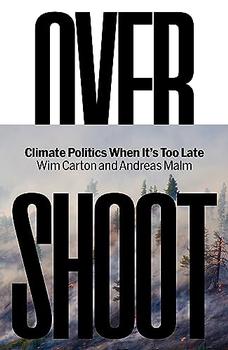
How the World Surrendered to Climate Breakdown
by Wim Carton, Andreas Malm
A scathing critique of proposals to geoengineer our way out of climate disaster by the bestselling author of How to Blow Up a Pipeline.
It might soon be far too hot on this planet. What do we do then? In the era of "overshoot," schemes abound for turning down the heat–not now, but a few decades down the road. We're being told that we can return to liveable temperatures by means of technologies for removing CO2 from the air or blocking incoming sunlight.If they even exist, such technologies are not safe.
They come with immense uncertainties and risks. Worse, like magical promises of future redemption, they might provide reasons for continuing to emit in the present. But do they also hold some potentials? In Overshoot two leading climate scholars subject the plans for saving the planet after it's been wrecked to critical study. Carbon dioxide removal is already having effects, as an excuse for continuing business as usual, while geoengineering promises to bail out humanity if the heat reaches critical levels.
Both distract from the one urgent task: to slash emissions now. There can be no further delay. The climate revolution is long overdue, and in the end, no technology can absolve us of its tasks.
"In a rousing conclusion, Malm and Carton survey potential economic solutions and come down in favor of a 'mercilessly confrontational' approach: scrubbing the fossil fuel industry's 'assets' fully off the books, the same way enslavers were not 'compensated' in the postbellum South. Readers will be overwhelmed but galvanized." —Publishers Weekly (starred review)
"The world has surrendered to climate breakdown. But that failure does not require us to continue surrendering to the power of fossil capital. In this brilliant and urgent analysis, Malm and Carton show how the failure came about, explore moments when it might have been resisted, explode the myth of "overshoot" that sustains business-as-usual, and lay out the challenge that a revolutionary climate politics must take on." —Timothy Mitchell, author of Carbon Democracy
"A brilliant and impassioned book, which explains why greenhouse gas reduction targets are repeatedly missed–and why they will never be met until the demon of fossil capital is laid to rest." —Nancy Fraser, author of Cannibal Capitalism
"The world we called unliveable and unforgivable just five years ago is now an imminent reality. There is no better map of that world, which we now must navigate, or our journey to it, through acquiescence and normalization, or the brutal path forward, intolerable but necessary, than this book. Please read it." —David Wallace-Wells, author of The Uninhabitable Earth
This information about Overshoot was first featured
in "The BookBrowse Review" - BookBrowse's membership magazine, and in our weekly "Publishing This Week" newsletter. Publication information is for the USA, and (unless stated otherwise) represents the first print edition. The reviews are necessarily limited to those that were available to us ahead of publication. If you are the publisher or author and feel that they do not properly reflect the range of media opinion now available, send us a message with the mainstream reviews that you would like to see added.
Any "Author Information" displayed below reflects the author's biography at the time this particular book was published.
Wim Carton is Associate Professor of Sustainability Science at Lund University, Sweden. He's the author of over 20 academic articles and book chapters on climate politics. His work has appeared in top journals such as Nature Climate Change, WIRES Climate Change and Antipode.
Andreas Malm is Associate Professor of Human Ecology at Lund University, Sweden. He is the author of several acclaimed books, most recently, with the Zetkin Collective, White Skin, Black Fuel: On the Danger of Fossil Fascism. His book How to Blow Up a Pipeline is an international bestseller and has been turned into a feature film.




When I get a little money I buy books...
Click Here to find out who said this, as well as discovering other famous literary quotes!
Your guide toexceptional books
BookBrowse seeks out and recommends the best in contemporary fiction and nonfiction—books that not only engage and entertain but also deepen our understanding of ourselves and the world around us.